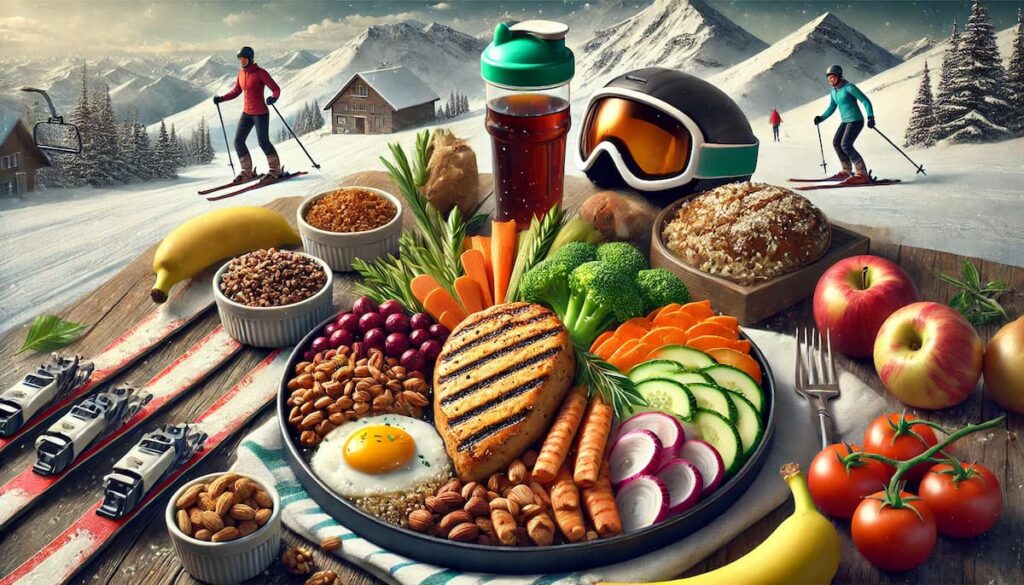To optimize skiing performance, prioritize meals with a balance of carbohydrates, lean proteins, and healthy fats. Incorporate fruits and vegetables to combat altitude stress and support overall health during intense skiing sessions.

Why is Nutrition Important for Skiers?
Nutrition is crucial for skiers to burn many calories during skiing, maintain energy, enhance performance, and recover effectively. Skiing demands strength, endurance, and agility, requiring a well-rounded diet that fuels the body, sustains energy levels, and aids in muscle recovery after rigorous activity.
Key Nutritional Components for Skiers
To achieve optimal nutrition, focus on these key components:
- Carbohydrates: Essential for energy, skiers should consume 6-10 grams of carbohydrates per kilogram of body weight daily. According to the American College of Sports Medicine, this level of carbohydrate intake is necessary to sustain energy during prolonged physical activity. Carbohydrates provide the primary fuel source during long skiing sessions.
- Proteins: Important for muscle repair, skiers need 1.2-1.7 grams of protein per kilogram of body weight. Include sources like lean meats, eggs, and legumes.
- Fats: Healthy fats are vital for sustained energy, making up 20-35% of total caloric intake. Sources include nuts, avocados, and fish.
Meal Planning for Skiers
Planning your meals around skiing sessions ensures you maintain energy and recover quickly:
- Pre-Skiing Meal: 2-3 hours before skiing, consume a meal rich in complex carbohydrates and proteins. Example: Oatmeal with banana and a boiled egg.
- During Skiing: Eat quick-digesting carbohydrates every 60-90 minutes, such as energy bars or fruit. Example: A granola bar or an apple.
- Post-Skiing Recovery Meal: Within 30 minutes after skiing, eat a combination of proteins and carbohydrates to replenish glycogen stores and repair muscles. Example: A turkey sandwich on whole grain bread and a smoothie with protein powder.
Hydration Tips for Skiers
Proper hydration is crucial to maintain performance and prevent altitude sickness. Research from the National Athletic Trainers’ Association indicates that even a 2% loss of body weight due to dehydration can significantly impair athletic performance, making consistent fluid intake before, during, and after skiing essential.
- Before Skiing: Drink 500-750 ml of water or a sports drink.
- During Skiing: Consume 200-300 ml of fluids every hour, ideally with electrolytes.
- After Skiing: Rehydrate with 500 ml of water or a recovery drink containing electrolytes and carbohydrates.
Best Snacks for Skiers
Include these snacks to maintain energy levels and support recovery during and after skiing:
- Nuts and Dried Fruits: Provide a mix of fats, proteins, and carbs for sustained energy.
- Energy Gels: Offer a quick source of energy during intense skiing.
- Greek Yogurt with Honey: A balance of proteins and carbs for recovery.
- Bananas: High in potassium, helping to prevent cramps.
Avoiding Common Nutritional Pitfalls
To maintain optimal performance and health, skiers should:
- Avoid Skipping Meals: Always eat a balanced meal before and after skiing to keep energy levels stable.
- Ensure Adequate Carbohydrate Intake: Consume enough carbs to fuel your body, especially on intense skiing days.
- Stay Hydrated: Drink fluids consistently before, during, and after skiing to avoid dehydration.
Dietary Considerations for Different Skiing Conditions
Skiing conditions can impact nutritional needs:
- Cold Weather: Higher fat intake may be necessary as the body burns more calories to maintain warmth in cold conditions.
- High Altitudes: Increase carbohydrate intake to prevent fatigue and support oxygen utilization.
Adjusting Diet for Multi-Day Skiing Trips
Maintaining your diet year-round, including during the off-season, is crucial. Training in the summer for cross-country skiing ensures your body stays in peak condition, ready to tackle the slopes as soon as winter arrives.
For multi-day skiing trips, focusing on recovery is key:
- Evening Meals: Should be rich in carbohydrates and proteins. Example: Grilled chicken with quinoa and steamed vegetables.
- Breakfast: High in carbs to replenish glycogen stores. Example: Whole grain toast with avocado and a side of berries.
- Snacks: Pack portable, energy-dense snacks like trail mix or peanut butter sandwiches.
- Types of Skiing Terrains: A Comprehensive Guide for Every Skier - December 6, 2024
- Skiing Nutrition: Essential Nutritional Advice and Meal Planning for Skiers - August 15, 2024
- Backcountry Skiing Explained: Essential Tips and Gear - August 8, 2024








